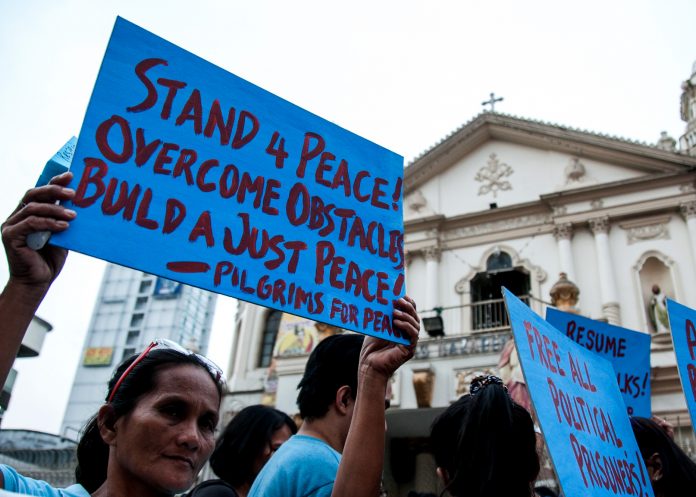Reflection for the 6th Sunday of Easter (Cycle C)
Chaos appears to be the order of the world, its perpetual disorderliness. It appears to be the destiny of peoples who do rightfully seek an identity and freedom for themselves, but who at the same time, unjustly seek the actualization of their humanity, without a commensurate responsibility for the destiny of others. It appears to be the fate of societies who deem it necessary to create cultures which demand equality with those from within, but which at the same time, condone inequality with those from without. It appears to be the inevitable future of communities who found it important to build borders which under the pretext of protecting or safeguarding their “identity and freedom,” are actually discriminating and oppressive, borders built not so much as to permit them to do what they wish inside their bordered territories, as to allow them to ignore and drive away the “strangeness” which surrounds them.
Is it not an irony of history for one’s liberty to be paid for at the cost of restraining it in another? And if one’s identity and freedom is at risk of being lost, such that borders are being threatened, or that the surrounding “strangeness” appears to have become too menacing or powerful, then are we not so being “wisely conditioned” to prepare to go to war?
War is therefore, not merely the absence of peace; it is the consequence of an absence of responsibility for the “strange other.” It is undeniably the outcome of an unfairness progressing uncontrollably towards persecution, which is being justified “in the name of identity, equality and freedom.”
Now, we can understand the words of the Christ: “Peace be with you! My peace I give to you; not as the world gives peace do I give it to you.” The peace which only the Lord can give, cannot be accomplished through our own efforts, because we must first learn to overcome our inclination to violence towards the uncertainty of “strangeness,” with total responsibility for the “strange other.”
Peace is not merely the absence of war and violence, but the absence of the intrinsic tendency to use it irresponsibly when we think or feel our circumstances will require it. Peace is ensuring the absence of unnecessary burdens upon anyone, while at the same time, ensuring the presence of sharing of necessary burdens with everyone.
Peace is therefore, the presence of responsibility, the presence of compassionate concern and appropriate action for the “strange other,” which were exemplified by our Lord for all those forsaken to dwell in the surrounding “strangeness.” Peace is not possible without the Spirit helping and giving it to us; it is a project of both the human and the divine. Peace is the presence of the Spirit. Thus said the apostles and elders of the early Church “to the believers of non-Jewish birth in Antioch, Syria and Cilicia”: “We with the Holy Spirit, have decided not to put any other burden on you except what is necessary.”
And how do we become one with the Spirit, in order to ensure peace? Jesus taught, “If anyone loves me, he will keep my word and my Father will love him; and we will come to him and live with him.” He promised us with profound conviction, the descent of the Spirit “whom the Father will send in my name, will teach you all things, and remind you of all that I have told you.” Do note that God is not in need of an earthly temple made by human hands, but of a body constituted by divine hands: “… for the Lord God, Master of the universe, and the Lamb, are themselves its temple.” God simply wants to dwell in us and for us, his most beloved creatures.
Similarly, the light of peace will not emanate from us as creatures, but only from the Creator: “The city has no need of the light of the sun or the moon, since God’s glory is its light and the Lamb is its lamp.” Hence, peace is the project of the divine in the human; those who instigate only hatred and sponsor only destruction will be held accountable to him who ultimately creates and destroys in order to re-create. So, Jesus affectionately advises in our courageous struggle for peace, in our perilous mission to re-create, “Do not be afraid!” Our love and our commitment to service is the guaranty which will brighten our hope in the eternal companionship of the One whose kingdom of orderliness shall reign forever.
Brother Jess Matias is a professed brother of the Secular Franciscan Order. He serves as minister of the St. Pio of Pietrelcina Fraternity at St. Francis of Assisi Parish in Mandaluyong City, coordinator of the Padre Pio Prayer Groups of the Capuchins in the Philippines and prison counselor and catechist for the Bureau of Jail Management and Penology.









